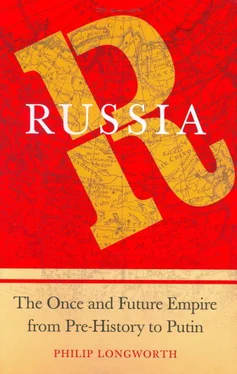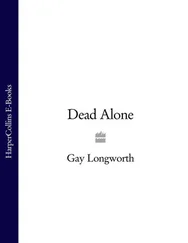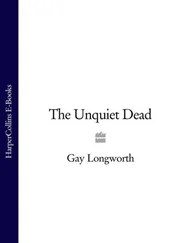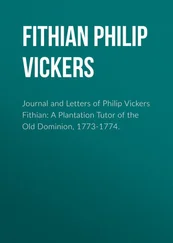Philip Longworth
RUSSIA
The Once and Future Empire from Pre-History to Putin
This book owes much to many helpers, but I alone am responsible for any errors it contains. I am grateful to former colleagues in three faculties of McGill University for advice in areas in which I lack expertise, and to the Department of History for granting me writing leave in the winter term of 2003. My debts to scholars in both Russia and the West go back many years, and are to some extent acknowledged in the references. I have also benefited from discussions with colleagues in the British Universities’ Association of Slavists’ Study groups on medieval and eighteenth-century Russia, the University of Budapest’s biennial seminar on Russian history, and the Royal Institute of International Affairs in London. McGill’s McLennan Library has a rich collection in the Russian area, and when it lacked an item I needed it readily obtained it for me. I am also grateful to the British Library and to the library of the School of Slavonic Studies in University College, London.
I am indebted to Bill Hamilton for the idea, to my conscientious and perceptive editor Gordon Wise, to Catherine Benwell and other members of the helpful John Murray team who saw the book through to its finished form, and, as always, to Ruth for her patience, encouragement and the critical eye which she applied to the entire text.
Philip Longworth
MOST EMPIRES RISE, expand and then collapse — and once collapsed do not revive. But Russia’s case is different. Russians have built no fewer than four empires. The first, the medieval commercial colonial empire of Kievan Rus, was destroyed in the 1200s. But some time later a new absolutist imperium, which tried to replicate something of the glory of the later Roman Empire, arose. It was centred on Moscow, the ‘Third Rome’ of legend. In the later sixteenth century, under Ivan the Terrible, it began to expand vigorously towards the Baltic, the Caspian and, across the Urals into Asia. Then, in the early 1600s, the state which was the motor of this empire suddenly seized up; Russia dissolved into confusion, and the neighbouring Poles were able to install their own tsar in the Kremlin. Yet out of the debris of Russia’s imperial collapse a third, more conventional, European dynastic empire soon emerged, rooting itself in the remains of its predecessor.
This Romanov Empire came to serve as the epitome of Russia’s power and aggression. It expanded into Ukraine, extended its hold on Siberia as far as the Pacific and the gates of China, and, having humbled Poland-Lithuania, proceeded to demolish the two great powers which dared to challenge it: Sweden and Napoleonic France. Having established itself as the strongest land power in Europe, it continued its expansion — through the Balkans towards the Mediterranean, across the Caucasus, and, to the consternation of the British, into the heights of Central Asia. It became a sea power to reckon with in the north Pacific, and even came to exert a certain influence in China. The Romanov Empire suffered reverses in the Crimean War and against Japan in 1904, though it lost little territory and influence as a result. Soon afterwards, however, during the First World War, this empire, too, disintegrated.
The Soviet state which supplanted it seemed unlikely to survive. Russia was racked by civil war, and was promptly invaded by British, French, Japanese and American troops. It lost a war with Poland too. Bankrupt, friendless and besieged, it nevertheless contrived, within the remarkably short span of a quarter of a century, to recover sufficiently to inflict a comprehensive defeat on Hitler’s Germany, Europe’s strongest military and economic power, together with its allies, and to dictate the shape of post-Second World War Europe. This Soviet Empire — more centralized and ideological than any of its predecessors — became the most extensive and powerful of all. It was also the most short-lived.
The purpose of the book is to examine the phoenix-like nature of Russian imperialism and improve our understanding of it. Why the strange alternation between aggression and fragility? Why the tendency for Russian empires to disintegrate as they did around the years 1240, 1600 and 1918, but then to rise from the ashes stronger than before? Why, for that matter, do Russians, as a society, tend to alternate between torpor and manic energy, and what are the sources of their resilience? What has enabled them to withstand invasions by numerically and technologically superior armies; to spring back and gain the strength to conquer immense tracts of territory and exercise dominion over millions of subjects of diverse cultures?
To find adequate explanations for these phenomena we need to describe the rise and fall of each Russian empire and inquire into its strengths and weaknesses. But we also have to delve back to times before the modern era which most general histories treat either cursorily or not at all, 1for it is only there that we can hope to find evidence that might illuminate some basic questions concerning the character of Russians: their psyche, habits and the singularities of their institutions, all of which were formed over time and in relation to physical conditions. And here we encounter a problem, because the early chronicles were composed to sustain the legitimacy and claims of princes rather than to provide objective records of circumstances and events. Nor are the earliest travellers’ accounts always reliable. Furthermore, such accounts begin too late in time. Since, as we shall see, there are good, scientific, reasons to believe that the Russians’ ancestors were explorers and colonizers for some time before the fabled founding father Riurik and his band of Viking venturers ever established themselves in their land, a way must be found of establishing relevant developments in periods unrecorded by conventional history.
To trace the origins of Russian imperialism, then, we need a wider range of tools than is offered by conventional history. The first chapter of this book will therefore exploit the findings of non-historical science — genetics, anthropology, archaeology and linguistics — to explore the roots of the phenomenon: the making of the landscape which formed the Russians’ habitat, their diet, physiognomy, migratory patterns, habits, capacities and disposition. Readers should discover that some of these findings will resonate from time to time throughout the book. However, those who prefer conventional history should start with Chapter 2 (where for their benefit I have repeated a few essential points made in Chapter 1).
Some new material appears in later chapters, though they are mostly based on the work of specialist historians who are acknowledged in the endnotes. There is no shortage of general books on Russia and Russian imperialism, of course, and each one represents a view. But this book differs from all of them in its perspectives. It examines the formative stages in the development of the land and its people which took place before the era of written record to which historians generally confine themselves. Some of the material it uses is new, and confronts some popular prejudices which are based on outdated readings of the evidence or which obscure the truth. No doubt I have made mistakes, but my conclusions have been based on evidence rather than preconceived ideas, whether pro- or anti-Russian.
Читать дальше









![Stephan Orth - Behind Putin's Curtain - Friendships and Misadventures Inside Russia [aka Couchsurfing in Russia]](/books/415210/stephan-orth-behind-putin-s-curtain-friendships-a-thumb.webp)





